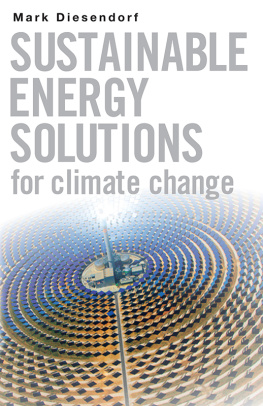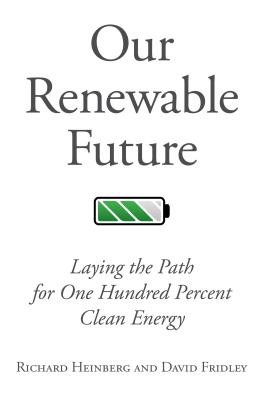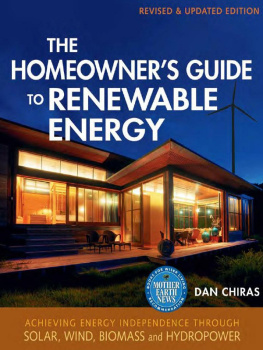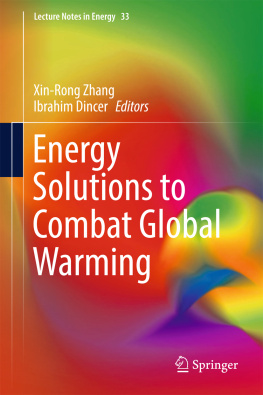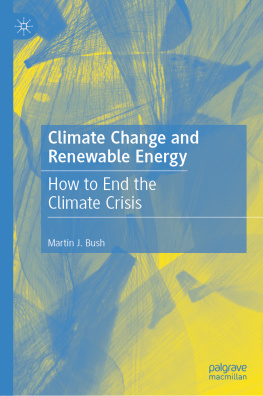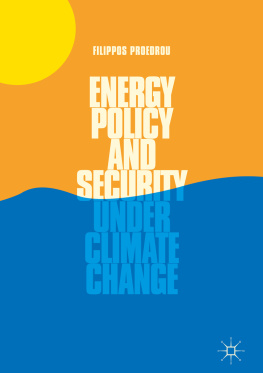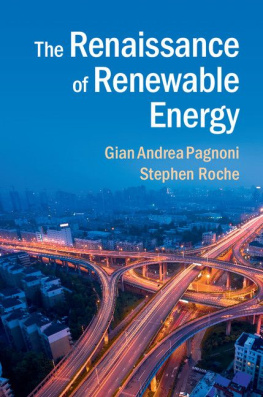SUSTAINABLE ENERGY SOLUTIONS
for climate change
MARK DIESENDORF is Associate Professor and Deputy Director of the Institute of Environmental Studies at the University of New South Wales in Sydney, Australia. He is researching scenarios for 100 per cent renewable electricity for Australia. His previous books include Greenhouse Solutions with Sustainable Energy (2007) and Climate Action: A campaign manual for greenhouse solutions (2009).
SUSTAINABLE ENERGY SOLUTIONS
for climate change
Mark Diesendorf

A UNSW Press book
Published by
NewSouth Publishing
University of New South Wales Press Ltd
University of New South Wales
Sydney NSW 2052
AUSTRALIA
newsouthpublishing.com
Mark Diesendorf 2013
First published 2013
This book is copyright. Apart from any fair dealing for the purpose of private study, research, criticism or review, as permitted under the Copyright Act, no part of this book may be reproduced by any process without written permission. Inquiries should be addressed to the publisher.
National Library of Australia Cataloguing-in-Publication entry
Author: Diesendorf, Mark, author.
Title: Sustainable energy solutions for climate change/Mark Diesendorf.
ISBN: 9781742233901 (paperback)
9781742246703 (ePDF)
9781742241685 (ePub/Kindle)
Subjects: Climate change mitigation Australia.
Climate change mitigation Government policy Australia.
Climatic changes Australia.
Science Social aspects Australia.
Greenhouse effect, Atmospheric Research.
Sustainable development Australia.
Climate change mitigation Research Australia.
Dewey Number: 551.6
Design Josephine Pajor-Markus
Cover design Di Quick
Cover images Gemasolar, Wikimedia Commons

All reasonable efforts were taken to obtain permission to use copyright material reproduced in this book, but in some cases copyright could not be traced. The author welcomes information in this regard.
CONTENTS
FOREWORD
This is a handbook for a better future. It reminds us that the unprecedented economic development of the 20th century was fuelled by plentiful cheap energy. The world is now completely different. Analysts established more than 50 years ago that conventional oil production would peak early in the 21st century. The energy source which now powers almost all our transport will become steadily more expensive. Supply interruptions are very likely. So the near-term future will require a new approach to transport. The second challenge for future energy use is global climate change. Our burning of fossil fuels is causing serious problems for all human societies as well as drastic consequences for the natural world. The Millennium Assessment Report warned that we are losing species at an accelerating rate as the driving forces of habitat loss, introduced species and chemical pollution are supplemented by climate change. The report stated that we could lose between 10 and 30 per cent of all mammal, bird and amphibian species this century. These are alarming consequences that demand a concerted international response.
At the same time, the global economic system is still showing the impacts of the 2008 Global Financial Crisis. The World Economic Forum has observed that the problems of fuel, food and finance are three canaries in the mine, indicating that the current economic system is simply not sustainable. We are now seeing the outcomes modelled for the Club of Rome over 40 years ago. Their report Limits to Growth projected that continuing existing growth trends would see environmental, social and economic collapse in the early to middle decades of this century. As the reports in the United Nations series on the Global Environmental Outlook have been warning for 15 years, the present approach is not sustainable, so doing nothing is not an option.
This book shows that there are realistic and cost-effective solutions. We can move rapidly to renewable energy supply systems. We can also improve dramatically the efficiency of turning energy into goods and services. We live at a level of material comfort that our grandparents could only dream about, made possible by enormous energy flows. Australian energy use is equivalent to us each consuming about 6 kilowatts continuously, about the energy that would be needed for every one of us to drive a small car 24 hours a day. Energy doesnt just light our homes, heat our water and propel our transport vehicles; it is a vital input to providing our food, our drinking water, our dwellings, our clothes and every other aspect of modern life. We dont actually need energy itself; as Amory Lovins said, we dont want energy, we want hot showers and cold beer! We demand the material comfort that is provided by the use of energy.
The technical and political challenge is to find ways of providing our material needs without depleting irreplaceable resources, polluting the air and changing the global climate. This book shows that a clean future is technically and economically achievable. It is possible to live at the same level of material comfort as we do now, using half as much energy or less. We can get all that energy from a mix of renewable energy supply technologies, using the resources of direct and indirect solar energy that will not be exhausted for billions of years. Reducing the environmental impacts of our energy use is only one of the urgent changes we must make, but it is the critical first step because energy provides most of our needs. It is also a significant step on the path to a future that could be genuinely sustainable.
The future is not somewhere we are going, but something we are all creating. At any given time, there are many possible futures. From that wide range, we must be trying to shape a future that is sustainable, at least in principle. At the moment we are fulfilling our desires in ways that reduce options for future generations, by depleting resources. We are essentially stealing from our own descendants. We are also meeting our needs in ways that radically change the global climate and precipitate a collapse of human civilisation. It is criminally irresponsible, but that is the approach we are now following. This book shows that a better future is possible. It is a call to action and a guide for responsible living.
Professor Ian Lowe AO FTSE
Emeritus Professor, School of Science, Griffith University
President, Australian Conservation Foundation
ACKNOWLEDGMENTS
I thank John Diesendorf, Brian Martin and my colleagues at the University of New South Wales Ben Elliston and Iain MacGill for valuable comments on sections of the manuscript. I also thank Johannes Luetz for unearthing some elusive references; Franziska Mey for providing information and references on energy cooperatives in Germany; Peter Newman for sending me preprints of some of his new articles on transport and urban form; and Frank Stilwell for clarifying some basic concepts in economics. The content of the book has been enhanced by these valuable inputs. However, the views expressed in the book, errors and omissions are my own responsibility.
I am grateful to Khanam Virjee, Commissioning Editor at Routledge-Earthscan, for bringing my idea for the book to her publishing company. At NewSouth Publishing it was a pleasure to work with Heather Cam, Jane McCredie, Elspeth Menzies and Uthpala Gunethilake. Copy editor Jessica Perini made many insightful suggestions for improving the content and writing of the manuscript. Yvonne Lee transformed several of my rough diagrams into professional figures. Sue Midgley was consistently helpful in liaising on my behalf with several contributors.

